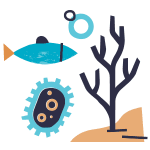Human activity conducted outside the region can also affect the ecosystem in the Wadden Sea: we refer to these effects as ‘indirect impact’. The main examples of indirect impact are climate change, emission of non-native substances (the effects of which are still largely unclear, e.g. medicine residues), plastic/microplastics and the introduction of non-native biota (exotic species) such as the Japanese oyster and various species of jellyfish. It is important that we improve understanding of these impacts and reduce them whenever this can result in improvement of the ecosystem.
This will be done in a trilateral manner to the greatest possible extent, and each time, a translation to the situation for the Dutch Wadden Sea will be required. It is also important that new bottom-up initiatives are actively encouraged and connections are made with policy and management.
Role of the PRW:


Results to be delivered:
- A clear picture of high-priority human impact on the marine ecosystem will have been established in 2019.
- Wherever possible, a clear picture of all possible measures that can reduce these types of high-priority human impact will have been established as of 2020, which will be implemented as of 2022.
Commissioning parties:
- Ministry of Agriculture, Nature and Food Quality
- Ministry of Infrastructure and Water Management
- Directorate-General for Public Works and Water Management
- Provinces in the Wadden Sea region: North Holland, Friesland and Groningen
- Natural Wadden Coalition
Follow-up action by:
- Directorate-General for Public Works and Water Management

